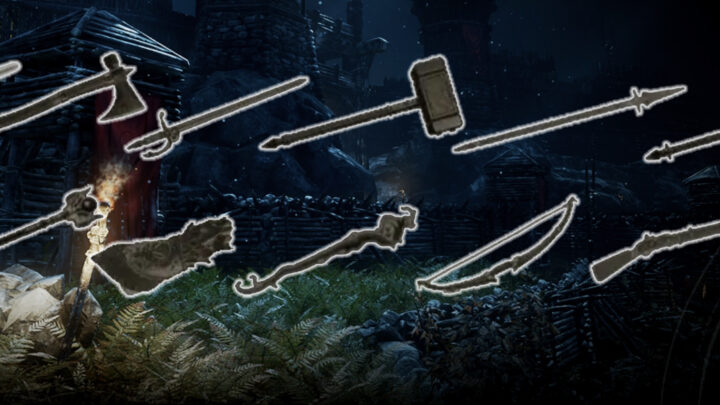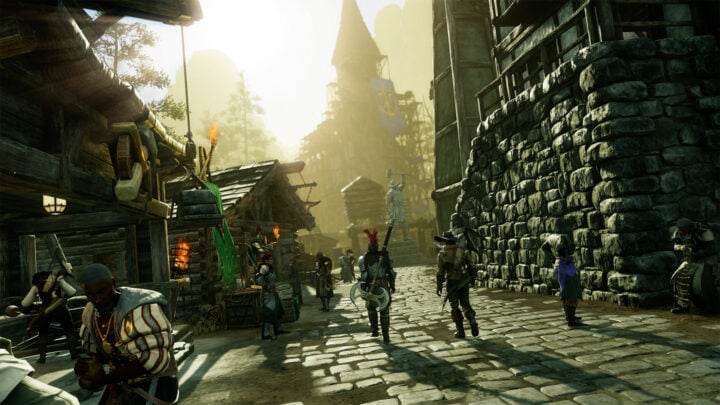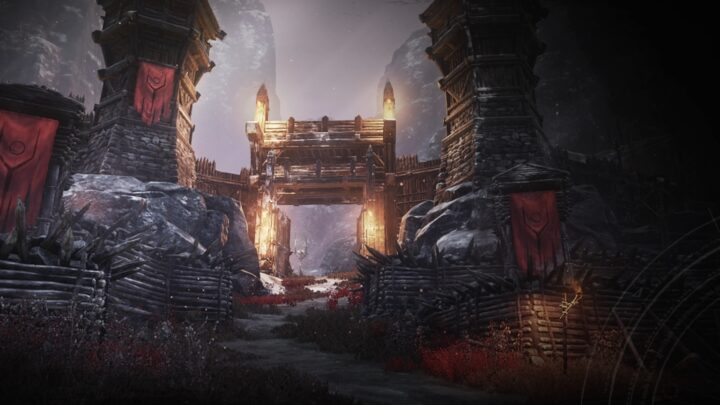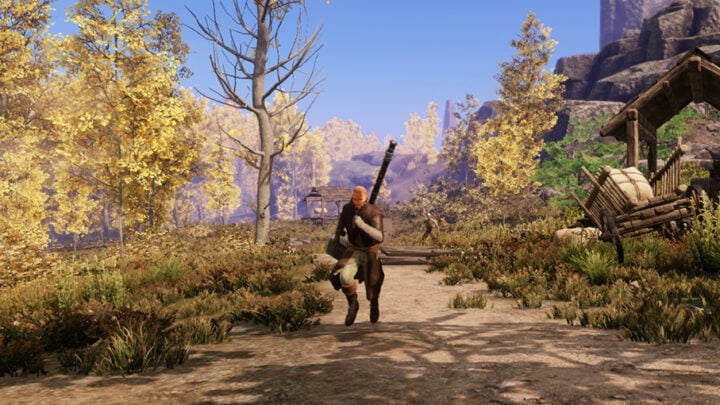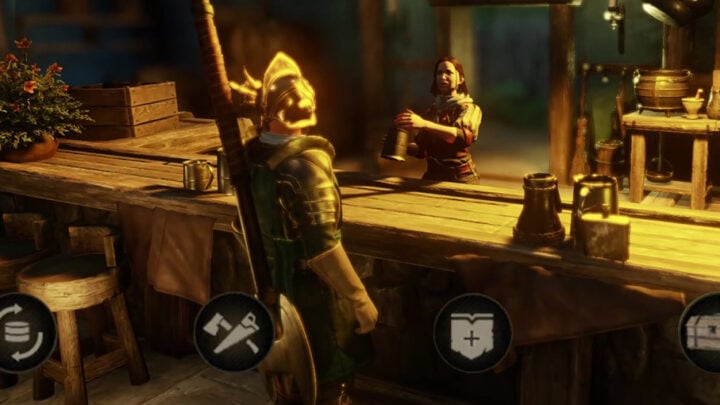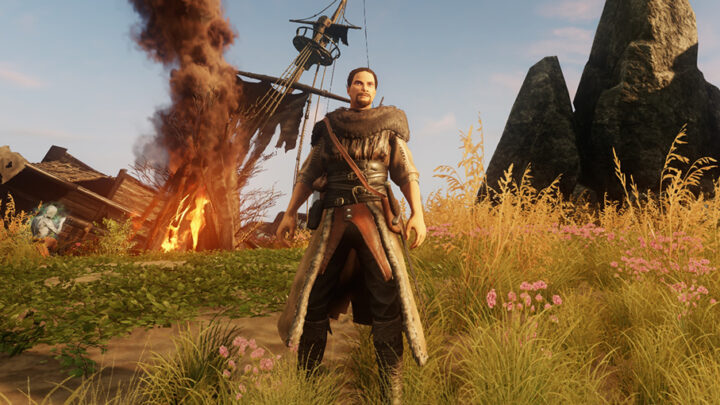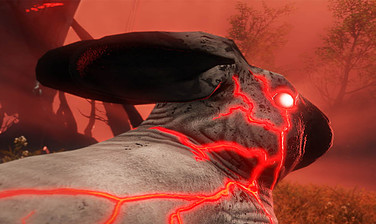Guide on how progression works in New World - all methods of progression explained with beginner tips on how to choose the best approach!
New World has plenty of ways to progress your character. From Core Attributes, to Trade Skills and even Weapon Mastery. We’ll be covering it all at a basic level here to help you understand how you can improve your character and get stronger.
Please note that we have a separate guide on How Leveling works in New World and there you will find a full overview of the leveling system as well as tips for how to quickly and easily gain levels and what content rewards you with most XP.
We have constructed this guide without including any story spoilers. We believe it to be safe for reading without being afraid something might ruin your experience with the narrative of the game. Images used here do now reveal the narrative and are primarily from the lower level characters. At the same time you will receive a ton of useful and helpful information for your journey in Aeternum!
Updated for New World Patch 1.2 “Winter Convergence Festival”
Table of contents
Core Attributes
Every player arriving on the shores of Aeternum has the same starting point as far as their character goes. Your character starts at level one with five points in each of the Core Attributes. These Core Attributes are:
- Strength
- Dexterity
- Intelligence
- Focus
- Constitution
Each of these Core Attributes affects combat in one way or another.
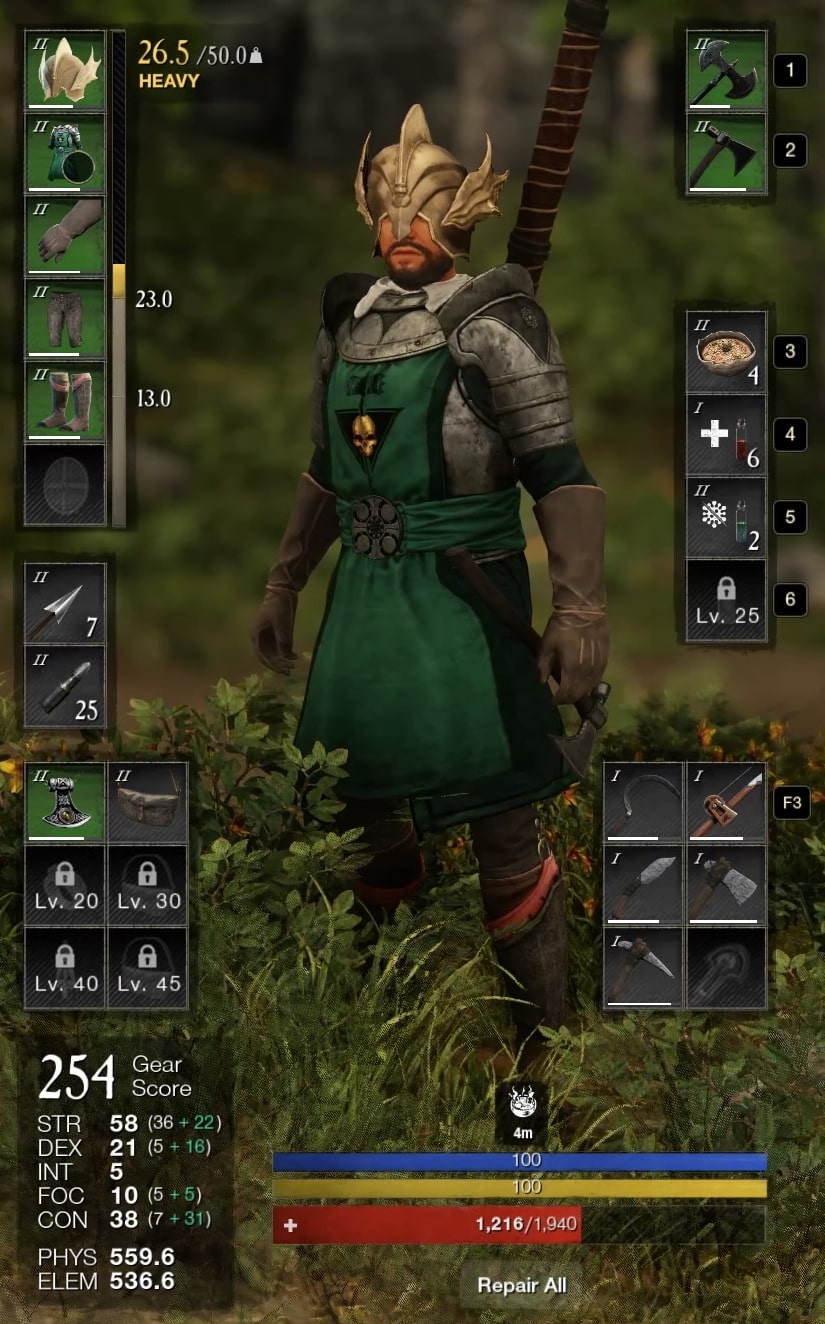
Stat gain from Attributes is soft-capped at 195, meaning to push over those values you’ll need to rely on armor, weapons, and trinkets. However, there are diminishing returns starting at 100 points, so it’s unwise to place all your points into a single combat stat. In fact, most weapons will require at least two stats to perform their best.
Your Core Attributes can be reset at any time for a small cost of in-game currency. This will let you fine tune your stat distribution and get the most out of your preferred playstyle or even swap to a new one.
Strength
First up is the Strength Core Attribute. Strength will be the primary stat for those wishing to use melee weapons, especially heavy weapons. Some melees will also scale off Dexterity as well to a lesser degree. Unless you’re forgoing melee entirely, Strength will be a good stat to put points into. Even someone specializing in range can benefit from having a melee to fall back on if they get rushed by an enemy.
Strength at higher values will also improve your Mining Skill. Starting at 50 points, you’ll get a 10% bonus to mining speed. You’ll unlock further bonuses every 50 points invested, including increased yield and a chance to instantly mine a node.
Dexterity
Speaking of Ranged Weapons, that’s where the Dexterity Core Attribute comes in. Dexterity will be the primary stat for those wishing to focus on Bows, Muskets, or Rapiers. Unlike lighter melee weapons, Ranged weapons scale heavily from Dexterity. Dexterity is great to put points into, as it will make your ranged weapons stronger as well as help out lighter melee weapons, alongside some strength.
Dexterity at higher values will improve your Skinning Skill. Starting at 50 points, you’ll get a 10% bonus to Skinning Speed. You unlock further bonuses to Skinning every 50 points after, including increase yield and higher chance of getting rare items.
Intelligence
Then there’s the Intelligence Core Attribute. Intelligence is the primary stat for those focusing on Magic, and a Secondary for Rapiers, Muskets and Magic Weapons. It will increase the damage of your spells as well as magical effects of some Magic Perks occasionally found on weapons. Unless you plan to use magic or a magic weapon often, this stat shouldn’t be a high priority for you.
Intelligence at higher values will improve you Harvesting Skill. Starting at 50 points, you’ll get a 10% bonus to Harvesting Speed. You’ll unlock further bonuses every 50 points invested, including increased yield and a chance to instantly harvest.
Focus
Up next is the Focus Core Attribute. Focus is going to be the Main stat if you want to focus on healing with the Life Staff. Otherwise this stat is a secondary one that will allow a mage to cast more frequently, as it controls your Mana Recovery Rate.
Focus at higher values will improve your Fishing Skill. Starting at 50 points, you’ll gain a 10% bonus to Fishing Line Tension. You’ll unlock further bonuses every 50 points invested.
Constitution
Finally, there’s the Constitution Core Attribute. Constitution increases your health. Unlike Focus however, most characters will want a fair amount of this stat. Unless you’re going for something like a very burst-heavy or general glass cannon-style build, extra health is almost always a welcomed stat. At the very least until you build up your other stats, it’s recommended to make sure you’re always picking up some at least.
The bonus health it offers is essential if you plan on Tanking for PvE content, or to help you survive longer in PvP.
Constitution at higher values will improve your Logging Skill. Starting at 50 points, you’ll gain a 10% bonus to Logging Speed. You’ll unlock further bonuses every 50 points invested, which include bonuses to yield and even a chance to instantly chop a tree.
Trade Skills
On top of your Core Attributes there’s a set of Seventeen different Trade Skills. These Trade Skills are broken down into 3 Categories; Crafting, Gathering and Refining. Each of these plays a distinct role in progression, though depending on how you want to play it’d be better to focus on the ones that matter for your class or needs.
Gathering Skills
We’ll start from the very basics and go upwards from there. The Gathering Skills focus on gathering materials from the various natural resources in the game. The Gathering Skills are Fishing, Harvesting, Logging, Mining and Skinning.
Leveling Gathering Skills will allow you to detect nearby resources as well as gather faster. As you reach certain level thresholds, resources will show up on your map and compass, within a small range.
Fishing
Fishing is as straightforward as it gets. You toss a line into the water and catch some fish. You’ll still have to manage your Fishing Line Tension to successfully catch a fish. When managed properly, Fishing can be a relatively quick process for small fish, but can still take longer for bigger and rarer fish.
Caught common fish can be salvaged for Fillets used in Cooking as well as Fish Oil which can be turned into Cooking Oil. Rarer fish can be broken down into other materials. As an example Clams will salvage into Clam Bait with a chance of a Pearl.
While Fishing you have a small chance to catch a Treasure Chest. These chests typically have Coins, Gems and Minerals in them. They can occasionally have some unique materials that can be used in crafting.
Out of the gathering Skills, Fishing is one of the slowest to level, but also can be the most profitable out of them. Fish Oil is often in high demand, as are fillets and select fish. Fish Oil is often used for Cooking, while the others are requirements for Town Job Board quests.
Harvesting
Harvesting allows you to gather plants. This means collecting Fiber for Weaving, as well as Fruits and Vegetables to cook.
Fruits and Vegetables turn into very useful foods that give stat boosts and other boosting effects that are great for combat. Very basic ingredients can be turned into rations that boost out of combat health recovery or mana regen.
Harvest can be pretty quick to level, if you can find a few areas with Hemp that you can harvest in a loop. To make the early levels go faster, I recommend harvesting farm plants early on. The player population in those areas should be high enough in the first days that the plants should spawn quickly.
If you also grab herbs, you can also make some decent money in doing so, on top of the constant demand for Fiber itself. Cabbage, Carrots, and Potatoes are all good farm plants to look out for as well, as they are used Luck foods for Gathering Skills.
Logging
Logging allows you to gather wood. Wood can be refined into Timber which is used in a large variety of items ranging from Housing Furniture to Weapons. It’s a common resource for most non-armor crafted items.
Given how most Trade Skills make use of wood, getting a higher Logging Skill can benefit you greatly. The only Crafting Skill that doesn’t really use wood at all is Armor Smithing.
Logging will often be the slowest Gathering skill to level, and on its own doesn’t bring high profits. To level it quicker, start with the smallest trees you can find (typically near starting shores and towns), and stick to them until you’re knocking them down in 2-3 hits. Once you have Steel Tools, you can try to move up to the largest ones you can find. They may still take a number of hits, but will also provide significantly more XP.
Mining
Mining allows you to gather Ore, Stone, Gems and other resources. These can be further refined through their respective refining skills to be used in Armor, Weapons and Trinkets and even some cooking.
Stone is gathered from Boulders, Ores are found from their respective nodes, while gems are typically found alongside Silver, Gold and Platinum nodes. The larger the node appears, the more of its resource it will give.
Mining can be leveled fairly quick if you can find an area to collect items without having to leave too much. Personally, I recommend going after stone until 20-25, unless you happen to find iron early on. Iron will often be pretty slow to gather until 50+ or you get better tools. I wouldn’t recommend going for Silver or Gold without decent Steel Tools.
Iron will be the easiest to sell and make consistent money from. Silver and Gold tend to be far less contested and make for great sources to grind XP with. Until you get access to Starmetal, you won’t have an option for super high profits.
Skinning
Skinning allows you to collect Animal Hides. These can be used for Armor as well as used as components for most Tools and Weapons. Higher level creatures take longer to skin, but give larger amounts of hide to be tanned into stronger Leather, as well as having higher chances of getting rare materials.
Similar to Logging, the Leather you can make by tanning the hides you collect are used in many of the crafting skills. Most Armor, Tools and Weapons will make use of it; however it’s not often used in Furnishing, outside of the occasional rug.
In addition to Hides, you’ll also typically get Raw Meat and other resources used for cooking based on what you’re skinning. Turkeys will often drop Eggs, Feathers and Poultry, where as Rabbits would give Game Meat and hide. Most predatory animals will drop higher tier meats and occasionally, rare crafting resources.
I personally recommend waiting until you get an Iron Skinning Knife to start with this skill. At Lower levels, a Flint Skinning Knife will still take quite a bit time for the small amount you’d get in return, while an Iron one provides a significant enough boost that will make thing easier and faster.
Refining Skills
Refining is the next set of skills in the crafting process. Refining Skills focus on converting the raw materials from Gathering Skills into usable Crafting Materials. The Refining Skills are Smelting, Stonecutting, Tanning, Weaving and Woodworking.
Leveling Refining Skills will allow a Refiner to make higher quantities of a refined material without extra resources. This come in the form of a chance for bonus items. This bonus increases as you level, and with some items.
Smelting
Smelting allows you to refine Ores into Ingots to be in various Crafting Skills. Metals such as Iron and Starmetal get used for Armor, Tools and Weapons primarily. These metals are also used for Furnishing, but to a much more limited degree.
Precious Metals like Silver, Gold, and Platinum are used in Jewelcrafting to make Rings and Amulets. These tend to be less sought after compared to other metals, simply because they’re only used in Jewelcrafting, and not in high quantities either.
Smelting also lets you turn Wood into Charcoal. Charcoal is primarily used to craft higher tier Metal Ingots, but is also used to make Stain to be used in Furnishing.
Smelting can be leveled very quickly once you find reliable sources of Iron or Silver. Silver tends to be easier XP, since it’s very often uncontested unlike Iron. Unfortunately, by itself Smelting will make less money as opposed to the raw materials from Mining. However, getting to the point where you can make Starmetal can be profitable in some situations.
Stonecutting
Stonecutting allows you to to refine Stone as well as cut Gemstones to be used in various Crafting Skills. This skill is also used to craft Tuning Orbs, which allows you to enter Expeditions, or rather Dungeons.
Gemstones play a huge role for a lot of classes, but none more so than Tanks and Healers. Tanks require the use of a Carnelian Gem in a weapon to be able to effectively hold enemy aggro and enable taunts. This same Gem is used in Armor for Healers to reduce their aggro, letting them heal with much less risk.
There’s also other gems that are important if you’re planning to primarily play an Intelligence or Focus-centric build, which give some scaling to weapons that wouldn’t normally use these stats. They covert 20-50% of a weapon’s damage to an element based on tier that will scale with Intelligence or Focus, making magic weapons some of the most flexible options as for what can be paired with it.
Stonecutting is best leveled by simply cutting stone into stone blocks or bricks. It’s plentiful and doesn’t take too much time to collect. It’s also highly recommended that unless you need or want to use a specific gem, to only fuse gems to higher levels. While it does give experience, fusion grants more than that of the cutting itself.
Tanning
Tanning allows you to refine Hides and Fur into Leather to be used in various Crafting Skills. Leather is used in nearly every. Leathers are often a component for Armor, Tools, Weapons and even some furniture. It’s most commonly used in Medium Armor.
Leveling this quickly depends on how many rawhides you can gather. As such, Wolf Dens tend to be good options early on while the starting area populations are higher. There’s an early quest that will send you there to kill wolves, but most people often don’t stop to think about skinning the wolves. This can be a quick and easy early source for Hides. Just don’t be rude and skin someones kill unless they walk away from it.
Like many of the refining skills, Tanning won’t make much money by itself. Thankfully, since Leathers are used for most crafting items, there’s still always a demand for it.
Weaving
Weaving allows you to refine Fiber into Cloth for various Crafting Skills. Much like Leather, its used in nearly every armor type. It’s most commonly used in Light Armor, where it’s the main component.
Much like Leather, leveling this skill depends on how much Hemp you can find. Though unlike the rawhides used for Leather, there’s no great early source for them. The best option for finding this early on tends to be to wander into higher level territories, where there’s less players roaming about. Stick to the first tier of refining until you have a reason to make some of the higher tiers, otherwise you’ll wasting resources if you end up needing to tier down.
Like many of the refining skills, Tanning won’t make much money by itself. Though Tanning and Weaving both have a highly marketable items they’re both needed to craft which can make it very worth leveling.
Woodworking
Woodworking allows you to refine Wood into Timber for use in various Crafting Skills. Like the other Refining Skills, the Timber and Lumber you create are used in a lot of things, though primarily Furniture, Tools and Weapons.
If you follow the tips given for Logging, you should also be able to level this skill just as quickly, if not quicker than Logging in some cases. Stick to which trees are fastest to knock down, and don’t worry too much about making the higher tiers of wood right as you unlock them. It’s best to be over-leveled for the increased chance of extra items while refining.
Like many of the refining skills, Woodwoking won’t make much money by itself. Similarly to Tanning Leather, there is still a pretty high demand for wood at all stages. So it can still make some, but there may not be as high of a demand.
Crafting Skills
Finally, the last step in the crafting process is the Crafting Skills. Crafting Skills used the Materials created by a Refiner to Craft everything from Weapons and Armor to furniture. The seven Crafting Skills are Arcana, Armoring, Cooking, Engineering, Furnishing, Jewelcrafting and Weaponsmithing.
Leveling a Crafting Skill unlocks additional and more powerful Crafting Recipes, as well as increases the chances for additional bonuses like Attributes and Perks to appear. Crafting is among the best ways to make powerful endgame gear.
Check out our Crafting Guide to get a more in-depth understanding of the crafting system and the best ways to utilize it.
Arcana
The Arcana Crafting Skill allows you to craft Potions, Tinctures, and Magical Weapons.
Potions are made from Harvesting Materials and provide instant bursts of restoration, while Tincture provides debuff cleansing and immunity as well as buffs towards each of the enemy factions.
There’s also plenty of potions that and helpful to Gatherers and Crafters, though they primarily are short duration boosts to Gathering Yield. They can also condense Elemental Motes into their higher tiers, which are used in various areas of crafting.
If you’re planning on using a Ice Gauntlet, Fire Staff or Life Staff; this skill is also used to create those weapons. They typically require a combination of Elemental Motes, Metals, and Wood to be crafted.
Arcana also benefits Jewelcrafting and Stonecutting quite heavily. Higher tier gems and jewelry take higher than the basic tiers of elemental motes to craft. Arcana is the Skill that lets you do this.
The most effective and least time consuming way to level Arcana is to craft magic weapons. They give the most XP, and don’t consume a ton of resources that are time consuming to get, outside of elemental mote. The only tricky part to them is getting the elemental motes, which requires time investment into Harvesting or Mining to more easily collect them. Otherwise you’re relying on getting them from rare spawns that also give high tier materials and will be sought after.
Potions are an option for leveling too, but will take more time to gather items for. As most of them use various herbs and mushrooms, which are less plentiful. If you’re playing a magic weapon, it’s likely you may level this passively just making mana potions from time to time.
Armoring
The Armoring Crafting Skill allows you to craft both Soft and Hard Armors. Lighter Armors like Cloth and Leather are made at the Outfitting Table, while Heavy Armors are crafted with the Forge. They can also create some utility items like Satchels, which increase your carrying capacity.
Everyone will make use of this skill early on. Outside of quests and random drops, it will be the easiest way you can upgrade your gear if you’re struggling to do so.
Armoring (and Weaponsmithing) has a good way to level at a decent pace, and almost more passively. Town Job Boards will often have a request for set of armor, which mostly only require raw materials, and occasionally some refined materials too. These often require less resource investment, letting you save resources for Engineering and Arcana crafts, which don’t have Town Job Board options.
Cooking
The Cooking Crafting Skill allows you to craft meals and non-magical drinks. Meals and Drinks provide a gradual recovery effect, or stat buffs that can increase your damage for a short time.
This skill is helpful and a must for all classes early on. It provides the easiest and most reliable access to healing you can get without potions. The Stat Buffing Meals are also a nice bonus but won’t be too feasible to make consistent use of early on.
If you’re the type that focuses on Gathering and Crafting, this Skill is also vital. There’s a lot of very helpful food buffs that make it easier to get rare materials or even boost the minimum gear score of crafted items.
Similarly to Armoring, Cooking also has Town Job Board request, which often require you to have various ingredients on hand, but give much more XP to the skill than mass crafting typically does. Sometimes these will also just ask you to craft rations as well.
Engineering
The Engineering Crafting Skill allows you to craft Ranged Weapons and Ammunition. They can also craft other useful items, specifically Tools. Tools are essential to speeding up the gathering process, especially if you get into Steel and Starmetal Tools.
This skill in particular is an important one for Bow and Musket players to focus on due to being a reliable means of crafting large amounts of ammunition as well as stronger ammo. Through the use of Schematics and Artifact Schematics, you’ll be able to craft a lot of your strongest weapons here.
By far one of the fastest way to level this skill is by Steel or higher tier Arrows. While it doesn’t gives a lot per craft, It takes very minimal amount of resources with the Steel often being the more time consuming part. The alternate way to get easy levels is to craft Bows, as they give a fairly high amount of XP and use more wood than metal, making them easier to craft then muskets.
If you’re looking to use this skill as a source of making early money, Tools are easily the way to go. Everyone needs them, so you cna make a decent amount off them, especially if you can get higher tier tools.
Furnishing
The Furnishing Crafting Skill allows you to craft Furniture, Storage and Trophies for houses. While nothing this skill makes is important until at least level 20, once there’s enough people at that point, the bonuses like extra storage space can really come in handy for many people, crafters especially.
Furniture is purely decorative for the most part, letting you make your house look lived in. Storage Chests are limited in quantity, but expand the storage space of the town your house is in. By the later stages of Housing, this increase can be rather significant; nearly doubling your storage space. Trophies provide you with various buffs to your character, which vary from trophy to trophy.
To level this skill more effectively, it’s worthwhile to craft items that don’t require wood and metal. While this leaves few options, the items often required otherwise are Fabrics and Leathers. These tend to be easier to get earlier on when Iron is highly contested and still offer decent XP.
Though if you can get a decent supply of metal, Large Funishings are the way to go. They often take more resources compared to smaller furnishings, but also tend to have a higher material to XP ratio.
Jewelcrafting
The Jewelcrafting Crafting Skill allows you to craft Trinkets, like Rings and Amulets.
As far as your gear goes, these tend to be the harder slots to fill with half decent items. There’s plenty of decent quest accessories that exist, but this let’s you make something more specialized for your build.
Jewelcrafting can be a bit tedious to level, as the easiest XP source is to mass craft Fittings and other jewelry parts. While jewelry itself is more XP, using flawed gems can be a waste unless it has perks you’re just not interested in. Once you have an abundance of them from Expedition or Mining however it is well worth the risk, as you have a chance of getting an uncut version of the gem back.
Weaponsmithing
The Weaponsmithing Crafting Skill allows you to craft Melee Weapons and Shields.
Much like Engineering is helpful to Ranged Weapons, this does the same for Melee Weapons. Through the use of Schematics and Artifact Schematics, you’ll be able to craft a lot of your strongest weapons here.
Similarly to Armoring, Town Job Board tasks are often a good source of XP, as they give more XP than any other craftable, and consume less resources than most crafts will for the skill. In addition they also tend to give large amount of XP towards player level and good amount of Territory Standing.
Trade Skill Aptitude
Trade Skill Aptitude is an additional progression and reward mechanic that unlocks for any Trade Skill that reaches the Trade Skill level cap of 200.
This system uses XP gained past Level 200 in a Trade Skill to reward you with items that help you further your craft. These rewards include extremely rare resources, special crafting items like Patterns and Timeless Shards, as well as plenty of Azoth to amp up your crafts.
Weapon Mastery
In New World, Weapons gain Experience from being used in combat. This experience will result in points to be used in a weapon’s Skill Trees.
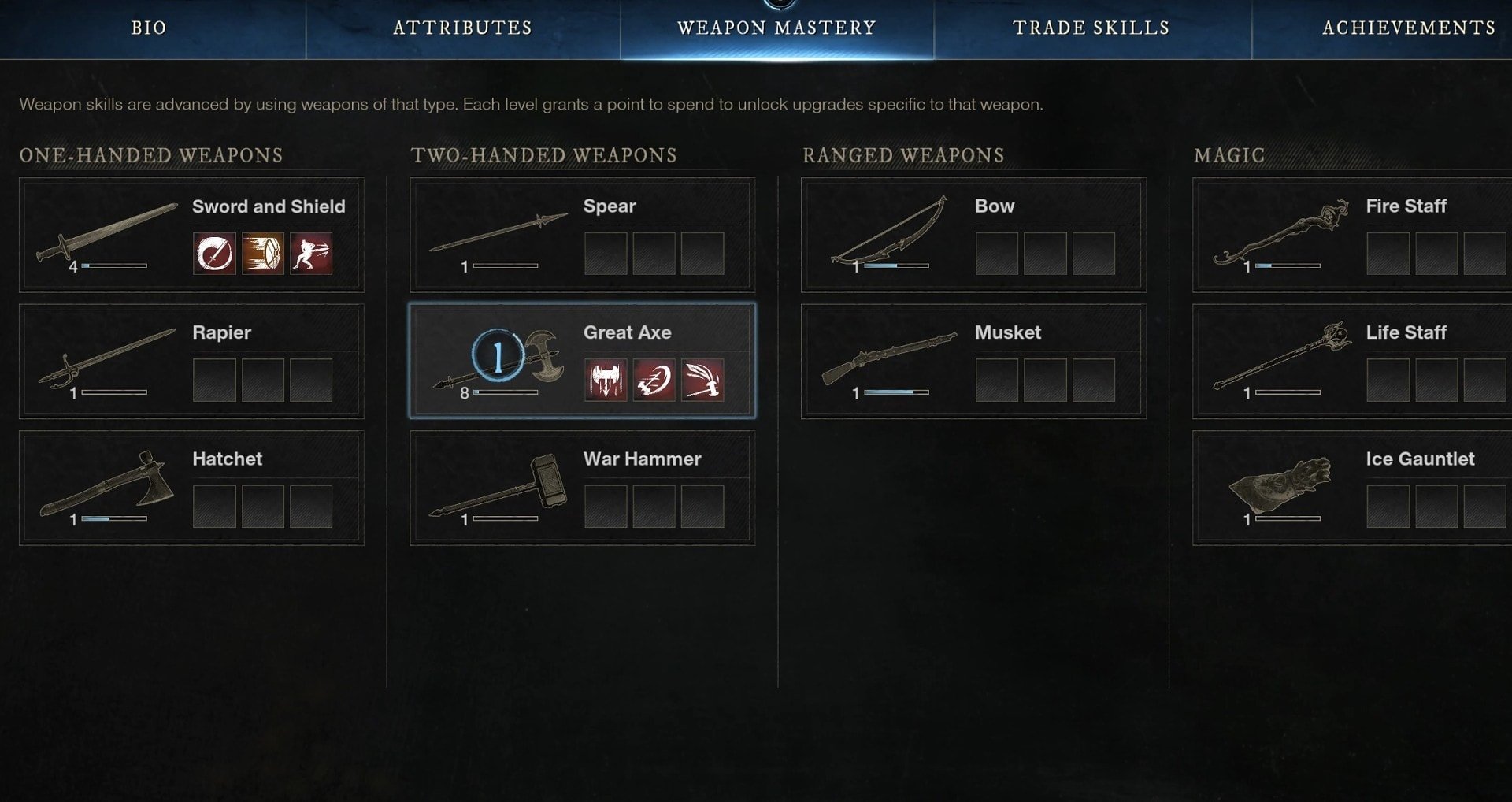
However, Levels and therefore Skill Points are limited for weapons, so Weapon Builds will need to specialize into one tree or the other to get the most benefit but it is possible to get some nodes from the second tree of a weapon as well if they fit the build.
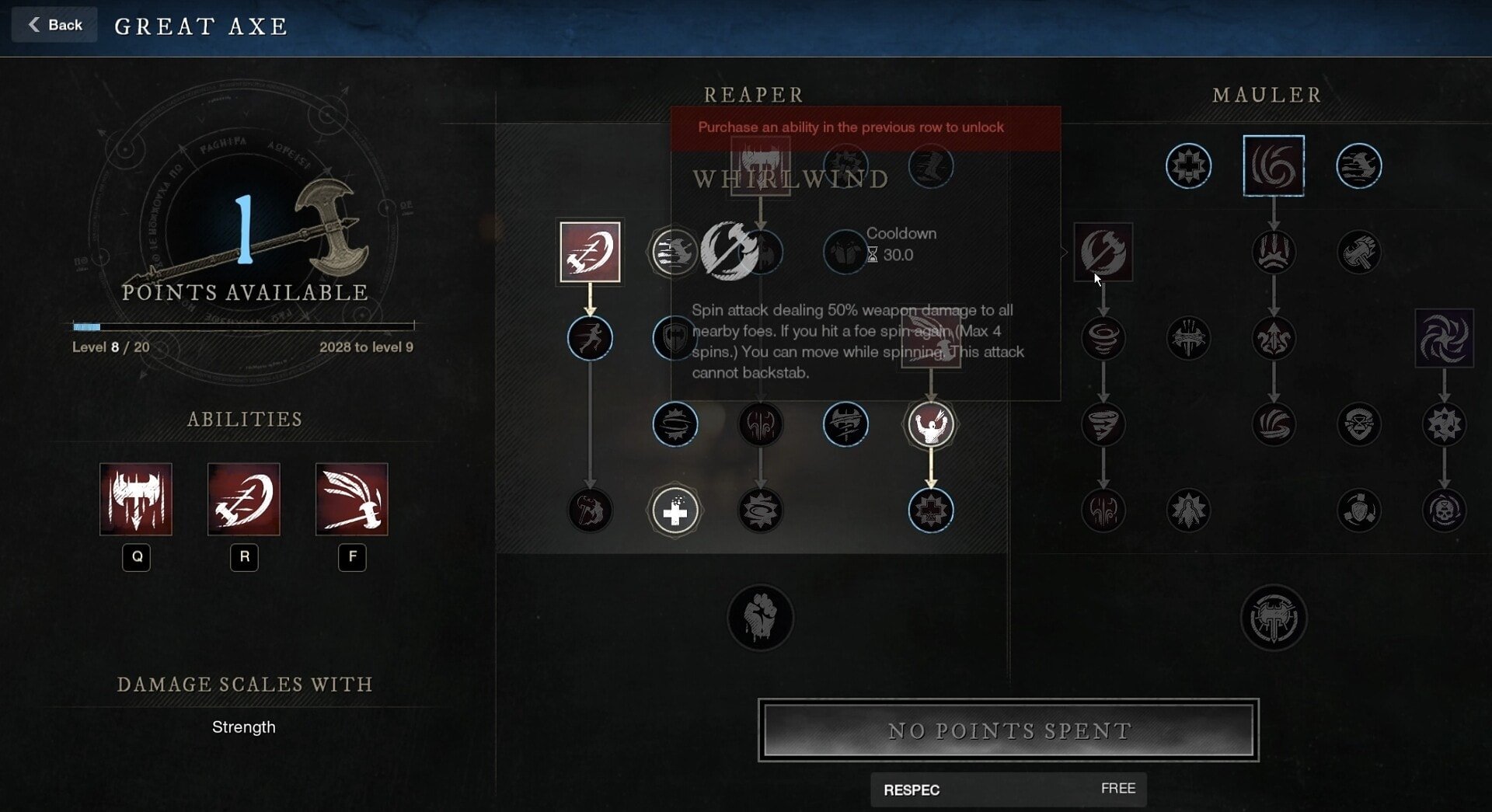
Each weapon has two Skill Trees that focus on different aspects of the weapon, each with their own passive skills, active skills, and other bonuses for the weapon. Each Weapon gets up to 20 Skill Points to be spent on these skills and bonuses.
For more information on Weapon Mastery, check out our Weapons and Abilities Guide to get an overview of the various Skill Trees. We talk about some of the options you have for using each weapon as well and some basic recommendations.
If you’re looking for Leveling or Endgame builds, check out our Weapon Guides and Builds Section for more information. There we cover various builds, from basic to more advanced concepts.
The Expertise System
The last part of progression occurs when you hit level cap and begin interacting with the Expertise System. This is an endgame system that takes a while to progress through, but allows you slowly increase your Gear Score up to its cap. This allow you to progress to stronger and stronger gear through drops.
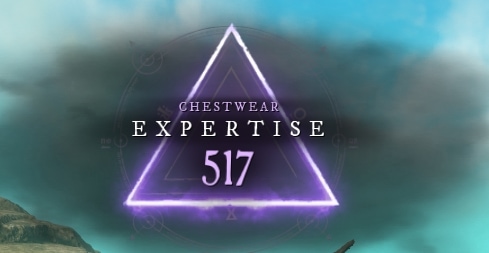
Each weapon type and armor slot are given their own Expertise value. This can make maxing out every weapon take a bit of time, but is the easiest way to progress to stronger gear without the need for crafting.
For more information on Expertise, check out our guide to help you Quickly Increase your Expertise. We cover the topic in more detail and give the best ways to increase your Expertise values.
Here at VULKK.com we have a great selection of New World Guides, including Beginner Guides, Weapon Guides and Builds and Expedition Guides. Check back regularly as we build our New World archives with more helpful content for you.
New World Beginner's Guides
A collection of must-read Beginner Friendly guides for Amazon Games' MMORPG New World. Learn the basics of the game, how to level up quicker and easier, how combat works, which reputation perks to get first, what to do and not do as a new player in Aeternum!
New World Weapons and Abilities Guide for Beginners
This guide’s focus are weapons in New World. We’ll cover the Weapons and their strengths, weaknesses, and what each of their skill trees do!
New World Settings and UI Guide: What Should You Change
New World has a lot of typical settings, and some you might not expect. We cover the best options to help you in combat, traversal, and more!
New World Tips: the DOs and DON'Ts for Beginner Players
Beginner friendly guide for New World for the key basic mechanics. Includes DO's and DONT's and some great tips and tricks for new players!
How Combat works in New World - A Beginner's Guide
Guide on how combat works in New World, for both PvE and PvP with a tips and tricks that can help you always make the most of your abilities!
How to Level Up Quickly in New World - A Beginner's Guide
Thorough explanation of how to Level Up quickly in New World - types of quests, zones, strategies, tips and tricks to level most efficiently!
New World Territory Standings Guide and Best Reputation Bonuses
Guide on New World Territory Standings and Reputations. Learn which bonuses are worth taking, when and why. We also included Priority lists!
New World Store Guide and Items Overview
This guide will explain everything you need to know about Amazon's New World Store - what is it, how to access it and what you can purchase!

